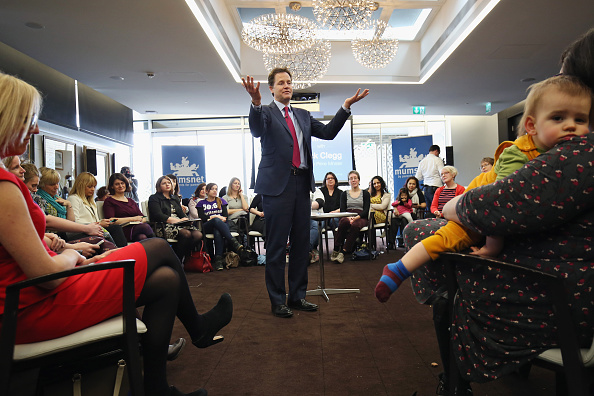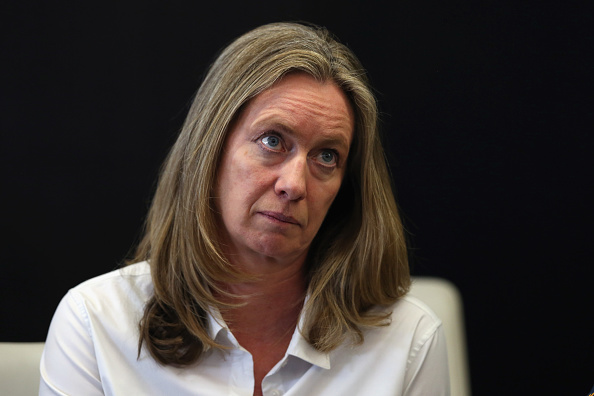In September, with the Labour Party under increasing strain on issues such as Brexit and antisemitism, British Shadow Chancellor John McDonnell sat down for one of his widest-ranging and toughest interviews yet. Instead of senior political journalists, however, his interrogators quizzed him from behind screens across the UK through a website known as Mumsnet.“Mumsnet did not set out to change the world or engage in an overtly political way,” its founder Justine Roberts tells me. “The opportunities came about because our users are so engaged and passionate.” Mumsnet’s first web chat with a major politician was with then-opposition leader David Cameron in 2006. Now, Roberts explains, “it’s become a bit of a rite of passage for any self-respecting senior politician.”
Advertisement
Since its conception as an online parenting network in 2000, Mumsnet has grown to boast over 10 million users and an annual turnover of £7.2 million. It continues to grow its users by 13 percent each month and has been referenced in Parliament, as well as hosting web chats with figures such as Hillary Clinton and then-prime minister Gordon Brown.Eighteen years on, though, the community is more likely to be referenced as both a significant mainstream political force and a touchstone for anti-trans sentiment and organizing in the UK. These two aspects of the social network may seem utterly contradictory, but closer analysis of its history and user demographics suggest that the two actually serve to complement each other.
Watch: Being Transgender in the Mormon Church In its early days, Mumsnet operated as a one-stop-shop for mothers. Amongst discussions about the practicalities of motherhood, childcare, support for disabled children, and a range of other topics, Mumsnet was most likely to hit headlines for the likes of the infamous "penis beaker” thread, which gained internet notoriety when a user asked for views on her post-sex cleanup arrangements.Roberts credits its membership with the growing influence of the site. “When our users saw that their voice was regarded as important and useful, they asked us to use what clout we collectively had to drive campaigns on issues such as rape myths, miscarriage care, and the treatment of children with disabilities and special educational needs.”
In its early days, Mumsnet operated as a one-stop-shop for mothers. Amongst discussions about the practicalities of motherhood, childcare, support for disabled children, and a range of other topics, Mumsnet was most likely to hit headlines for the likes of the infamous "penis beaker” thread, which gained internet notoriety when a user asked for views on her post-sex cleanup arrangements.Roberts credits its membership with the growing influence of the site. “When our users saw that their voice was regarded as important and useful, they asked us to use what clout we collectively had to drive campaigns on issues such as rape myths, miscarriage care, and the treatment of children with disabilities and special educational needs.”
Watch: Being Transgender in the Mormon Church

Advertisement
Sarah Pedersen, professor of communications and media at Robert Gordon University, has carried out extensive research into Mumsnet. “The influence stems from the type of woman it attracts,” she tells me. “Research shows it has an overall middle-class demographic: a high percentage of its members are graduates and working at least part time outside the house.

The range of experience of members is amazing—journalism, PR, law, government and business leadership—which means different groups of members are able to quickly organize and campaign on particular issues.”Mumsnet has led a number of successful campaigns: its 2010 ‘Let Girls Be Girls’ campaign against the sexualization of children saw recommendations incorporated into a government review, and the ‘Let Toys Be Toys’ campaign in 2016 garnered widespread support in its fight against gendered toys.But if, as Roberts and Pedersen assert, the community’s influence is a result of its engaged membership, Mumsnet finds itself at the political whims of a very particular membership base. When it comes to Mumsnet’s reputation for transphobia, it seems that the very demographics to which Pedersen attributes its success may have resulted in an especially narrow vision of womanhood—one that specifically excludes trans women.
Since 2016, Mumsnet—specifically its Feminism board—has increasingly found itself on the receiving end of criticism from trans people and their allies. “When I started using Twitter and engaging in the trans sphere in mid-2017, Mumsnet was constantly referenced both on my timeline and in DMs,” says Joss Prior, a trans woman who is part of a sizable trans community that monitors and discusses Mumsnet regularly. “The whole of the Feminism board was like a spectre hanging over the daily trans discourse.”
Advertisement
Prior points to the now partially-deleted but notorious 2016 “I Am Spartacus” thread in which a user asserted that “men cannot become women, ever. Women cannot become men, ever” and went on to misgender a number of trans men and women, including high-profile campaigners Paris Lees and Danielle Muscato. The post sparked thousands of supportive comments and is consistently referenced in up-to-date threads, with “I am Spartacus” acting as a shorthand rallying call for anti-trans feminists. Attempts have even been made to organize campaigning activity around the phrase.
In March of this year, Mumsnet was used to organize against Girlguiding’s trans-inclusive membership policy in collaboration with anti-self identification campaign group Fair Play For Women. Users also responded to Gender Recognition Act proposals that would allow trans people to self-identify with protests such as Man Friday, a campaign that encourages cis women “identify as men on Fridays" and partake in male behaviours like “manspreading and mansplaining” or to access single sex male spaces such as changing rooms, swimming facilities, or sports clubs.“It’s a core group of a few hundred hardcore trans-exclusionary radical feminists (TERFs), a tiny percentage of overall users,” says Christine, the mother of a trans child and also part of the network that regularly monitors Mumsnet. (Christine’s name has been changed for privacy reasons.) “Yet the Feminism board is just 90 percent discussions about trans people on any given day.”
Advertisement
Testing this out across four consecutive days, I found threads about trans rights and related topics to consistently dominate the Feminism board, with new threads appearing more than hourly and the handful of unrelated topics receiving only a fraction of the same engagement in terms of comment numbers. Topics during this time included discussions about specific trans campaigners, gender reassignment surgery for children, and the now-closed Gender Recognition Act consultation. Searches for the names of high-profile trans women throw up many instances of deadnaming and misgendering amid sometimes intensely personal insults. A search of my own name returns a post calling me “a witless handmaiden” for supporting trans people on Twitter.In March of this year, former intern Emma Healey publicly criticized the site’s stance on trans rights and shared private internal communications on the subject. Healey alleged that the “vast majority” of trans discussion on Mumsnet “descends into scaremongering and hate speech,” claiming that the company dismissed staff concerns about the offensive tone of the posts. In April, former Mumsnet employee Hannah Woodhead wrote in Huck magazine: “The anti-trans community on Mumsnet is something of an open secret. It has been present for years, and it appears that there has, for a while, been a lax approach to tackling this particular form of hate speech.”A search of my own name returns a post calling me “a witless handmaiden” for supporting trans people on Twitter.
Advertisement
Prior argues that Mumsnet has been hijacked by anti-trans campaigners as a safe space for organizing, rather than the sentiment having grown organically through its original base. “As one of the few popular sites still pushing out-of-date 70 and 80s rhetoric, it became a beacon and attracted more and more people looking for confirmation bias,” she says. “I don’t think [transphobia] was ever the starting point for Mumsnet, merely an inevitable consequence of the people and rhetoric they uphold.”The rhetoric Prior refers to here is, she explains, “essentially second wave—and what might now be known as ‘white feminism.’ It reminds me of the kind of puritanical beliefs that underpin some strains of homophobia and it is completely hostile for intersectional feminists or anyone who doesn’t fit a white, cis, feminist ideal.”Christine agrees: “It’s all about biological essentialism which is at the heart of reinvigorated radical feminism. When you believe that what makes a woman is only her biology, the result is a policing of womanhood and a very narrow academic and ideological perspective of what feminism and gender should be.”

Prior points out that this narrow view of feminism is also embedded in the British media and political establishment: “I see it as an axis between the right wing-press and the idea that it is just a forum for everyday moms. It gives the press some legitimacy in their false dichotomy that this is a battle between trans women versus cis women.” This relationship hints at the tension at the heart of Mumsnet’s transphobia problem: that its political and social clout may not exist in spite of the transphobic views of its membership, but in part because of them.
Advertisement
The trans people and allies that I spoke with allege specific tactics used to shut down dissenting views, including posting coded emojis or food references and recipes to derail threads in support of trans people. They also claim that archiving services previously used by the trans community to collect transphobic threads have been blocked by Mumsnet in recent months. (Roberts told Broadly that this was an unintentional result of a recent switch to a firewall provider that blocks more bots and site-scrapers.)
When asked directly about the accusation that Mumsnet has become a hotbed for transphobia, Roberts cites free speech and open debate. “For every one person accusing us of this, there’s at least one gender-critical feminist accusing us of being anti-feminist or bowing to the patriarchy,” she tells me. “We support free speech, and the right to express opinions or thoughts with which other people might disagree. Anyone is welcome to join the debate. So long as they’re posting in good faith and abiding by our Talk guidelines, they’re welcome.”A set of principles related to the discussion of trans issues were added to these guidelines in June in response to accusations of transphobia. Moderators are now allowed to delete deadnaming, misgendering, and negative generalizations—but also terms such as “cis” and “TERF,” on the basis that they may be an “affront” to feminists.Politicians like David Cameron were undoubtedly shrewd to pay attention to Mumsnet. As an organized group of mothers—often neglected by politicians—they are seen more as winnable voters than hardline party loyalists. It is telling, though, that parenting networks—shown in academic research to be largely dominated by white, middle-class, heterosexual women—like Mumsnet have managed to make political inroads in a way that few other lobbying groups ever achieve.But centering the reproductive role of predominantly privileged women may have led to the Catch-22 that the company finds itself in today: How can it deal seriously with increasing public criticism of exactly the kind of discussion that seems to keep its users engaged and Mumsnet influential? Or—as former employees like Healey and Woodhead claim—does Mumsnet simply not care?Of course, the issue of how to manage extreme or offensive content by users is not a new problem for internet forums. Twitter has long faced accusations that it does not take abuse or harassment seriously. Gab, a self-described “free expression” forum, was criticized for hosting antisemitic content and allegedly allowing white nationalist groups to use their platform. (Gab was later banned by tech firms like GoDaddy and Paypal after it transpired that Pittsburgh synagogue shooter Robert Bowers had frequented the site.)The distinction between online “free speech”—often posited as a defence by website owners and admins—and offline harassment and abuse is becoming increasingly discredited. Online spaces are under more pressure than ever to take accountability and deal seriously with hateful and offensive posts. It is under this same scrutiny that Mumsnet finds itself in its current existential dilemma.“It is widely acknowledged that Mumsnet is one of a limited number of sites allowing discussion on some very controversial subjects,” says Pedersen. “I think that this has attracted new members to the boards and increased its political presence. But,” she says diplomatically, “it has at times been problematic for Mumsnet as a brand.”